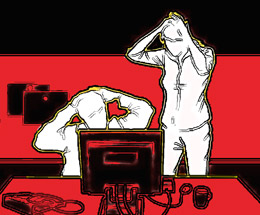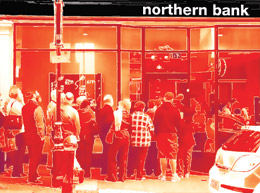World Without a Web: What Will Happen if the Internet Dies?
Sign up to receive The Snapshot, a free special dispatch from Laptop Mag, in your inbox.
You are now subscribed
Your newsletter sign-up was successful
The recent attack on Chinese dissidents’ Gmail accounts that was purportedly carried out by the Chinese government isn’t the first time the security of the Internet has been called into question. But it did get people talking again about a possible “digital Pearl Harbor.” This phrase is meant to describe a crippling and amorphous offensive on a country’s digital infrastructure. The maxim has become a meme at best, and a scare tactic at worst.
By most accounts, such an attack is thankfully improbable. The very question of such a strike appears to annoy noted security expert Bruce Schneier, author of Applied Cryptography—among other books on the subject—and a source for Congressional hearings on security several times over. He claims that it’s not in our enemies’ best interest to cut off the Internet. For one, eavesdropping would be harder for them. And how would an adversary know it had won? “If we attacked Russia and disabled their communications system, there’s no way they could surrender,” he said.
This dismissive tone, however, makes futurist Watts Wacker’s hair stand on end. “I think there’s as much likelihood of some sort of massive cyberspace attack, if not even more so, than there would be some sort of crude, rudimentary biological or atomic attack,” said Wacker, who wrote The 500 Year Delta: What Happens After What Comes Next. Schneier retorted that many things are possible, but we can’t live in fear of them all. Besides, he said, the Internet is fixable: “Satellites go down, there are large power outages. All of these things that the bad guys supposedly can do happen occasionally by accident. We fix them and move on.”
Take, for instance, the severing of three underwater optical cables in 2008, which led to widespread outages in India, Egypt, and other Middle Eastern countries. After an investigation, authorities attributed the damage to dropped anchors.
What’s disturbing, though, is that because the consensus seems to be that a “digital Pearl Harbor” is unlikely, the government probably isn’t sufficiently prepared for one. We also enlisted Tobias Buckell, science fiction writer and author of the New York Times bestseller Halo: The Cole Protocol, to imagine a world in which the Internet is not so easily restored. Whether by accident, natural disaster, terrorist attack, or virus, what would happen if millions of digital natives (or converts) were forced to live as if the year were 1994 for an extended period of time, with no solution in sight? What happens in the first day, the first week, the first month, and after all hope is lost?
Immediately
E-commerce, e-mail, instant messages, and video calls become impossible, while calendars and shared web documents are now inaccessible. Productivity screeches to a halt, and almost everyone’s livelihoods freeze. None are more affected than people whose jobs don’t just require the Internet, but are the Internet. From web designers to online advertisers to bloggers, many jobs disappear outright in an instant. As a result, says Buckell, mechanical engineers and more hands-on professionals (read: blue-collar workers) suddenly become essential.
Sign up to receive The Snapshot, a free special dispatch from Laptop Mag, in your inbox.
First Week
People travel everywhere with hard drives in lieu of being able to send information through e-mail, or to store it in the cloud. Road warriors and students use them to store documents that they can later share with a team. Not so bad, considering it was just five years ago that people carried USB thumb drives everywhere. (Reportedly, Peter Jackson carried a hard drive everywhere while filming The Lord of the Rings in rural New Zealand because the Internet connection there was too slow to send enormous files.
The next stage: panic. With online banking dead and the virtual disintegration of publicly traded companies, cash will become the hot commodity. Cue an almost instantaneous run on banks, and violence when they eventually shut their doors.
Toward the end of the first week, says Buckell, people will have to rethink currency. After all, how can someone earn money if their profession is suddenly meaningless? And without money, how can one buy food, shelter, toilet paper, and diapers? A barter system emerges in local communities. Crime goes up as people begin stealing out of desperation (not unlike the rise in petty crime during the most recent recession). Some people, though, gather at churches and other community centers to form neighborhood watches. Buckell says this happened in the Virgin Islands, where he grew up, after hurricanes. Reasonable and entrepreneurial people start learning new skills and trades, but most folks keep their money in sight while they consider future livelihoods. Friends mean people you can see, and don’t mind speaking to.
Smaller companies are crippled. Larger businesses, such as McDonald’s, splinter into smaller companies, which each operate as somewhat independent franchises; orders from corporate headquarters take time to filter down to various branches. Phone trees are organized to help keep everyone informed.
First Month
Wacker argues that within weeks, what started as local panic will spread to international relations. “Thank God we have a nice relationship with Canada,” he said. Even on a domestic scale, he warned there are fringe groups waiting to pounce on weaknesses in the federal administration. Take, for instance, the Michigan-based radical Christian group busted back in March on charges of conspiring to kill police officers and then attack a funeral so that they could kill more law enforcement officials when they eventually showed up (all this in the name of fighting the antichrist). “This fringe of society has been preparing for this from the get-go,” Wacker said. “People would die.”
While local businesses take the reigns from multinational corporations, the local food movement takes off, predicts Buckell. After all, the Internet helped coordinate food delivering logistics over long distances. Farmers' markets get swamped with people, and whatever international food Wal-Mart and other grocery stores have will soon fly off the shelves. People can survive on stocked food for a couple weeks before true desperation shows itself, and before geographic relocation to various food sources becomes a more pressing option.
Long Term
With all hope of repair to the Internet gone, people turn on each other. At least, so predicts Wacker. A social scientist by training, he says that the five tenets of civilization—a belief system, faith system, lifestyle, modes of communication, and how we treat one another—would collapse under the stress of having to revert to an era that too many digital natives never knew. Wacker suspects the U.S. doesn’t have the tools to respond to a crisis, sans Internet. The result: panic. “How we treat other members of our species would go to hell in a heartbeat,” he said.
Lucky for us, then, that a long-term loss of the Internet, even by accident, is unlikely. “We’ve seen some pretty nasty cyber attacks, and we survive them,” said Schneier.
Dana Wollman was a contributing writer at Laptop Mag. Her coverage included reviews of some of the most iconic laptops from the previous decade, such as the Dell XPS, Dell Studio, HP EliteBook, and MSI Wind. She focused on smaller netbooks and productivity-oriented devices. After Laptop Mag, Dana worked as an Editor-in-Chief at Engadget, and is now a Senior Technology Editor at Bloomberg.



